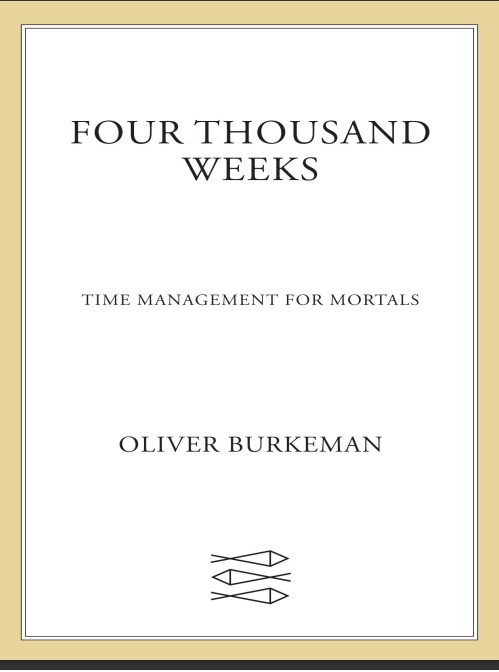FOUR THOUSAND WEEKS
Time Management for Mortals
By Oliver Birkeman
FOUR THOUSAND WEEKS – In the Long Run We’re All Dead –The average human lifespan is absurdly, terrifyingly, insultingly short. Here’s one way of putting things in perspective: the first modern humans appeared on the plains of Africa at least 200,000 years ago, and scientists estimate that life, in some form, will persist for another 1.5 billion years or more, until the intensifying heat of the sun condemns the last organism to death. But you? Assuming you live to be eighty, you’ll have had about four thousand weeks.
Certainly, you might get lucky: make it to ninety, and you’ll have had almost 4,700 weeks. You might get really lucky, like Jeanne Calment, the Frenchwoman who was thought to be 122 when she died in 1997, making her the oldest person on record. Calment claimed she could recall meeting Vincent van Gogh—she mainly remembered his reeking of alcohol—and she was still around for the birth of the first successfully cloned mammal, Dolly the sheep, in 1996. Biologists predict that lifespans within striking distance of Calment’s could soon become commonplace. Yet even she got only about 6,400 weeks.
Expressing the matter in such startling terms makes it easy to see why philosophers from ancient Greece to the present day have taken the brevity of life to be the defining problem of human existence: we’ve been granted the mental capacities to make almost infinitely ambitious plans, yet practically no time at all to put them into action. “This space that has been granted to us rushes by so speedily and so swiftly that all save a very few find life at an end just when they are getting ready to live,” lamented Seneca, the Roman philosopher, in a letter known today under the title On the Shortness of Life. When I first made the four-thousand-weeks calculation, I felt queasy; but once I’d recovered, I started pestering my friends, asking them to guess—off the top of their heads, without doing any mental arithmetic—how many weeks they thought the average person could expect to live. One named a number in the six figures. Yet, as I felt obliged to inform her, a fairly modest six-figure number of weeks—310,000—is the approximate duration of all human civilization since the ancient Sumerians of Mesopotamia. ‘On almost any meaningful timescale, as the contemporary philosopher Thomas Nagel has written, “we will all be dead any minute.”
It follows from this that time management, broadly defined, should be everyone’s chief concern. Arguably, time management is all life is. Yet the modern discipline known as time management—like its hipper cousin, productivity—is a depressingly narrow-minded affair, focused on how to crank through as many work tasks as possible, or on devising the perfect morning routine, or on cooking all your dinners for the week in one big batch on Sundays. These things matter to some extent, no doubt. But they’re hardly all that matters.
The world is bursting with wonder, and yet it’s the rare productivity guru who seems to have considered the possibility that the ultimate point of all our frenetic doing might be to experience more of that wonder.
The world also seems to be heading to hell in a handcart—our civic life has gone insane, a pandemic has paralyzed society, and the planet is getting hotter and hotter—but good luck finding a time management system that makes any room for engaging productively with your fellow citizens, with current events, or with the fate of the environment.
At the very least, you might have assumed there’d be a handful of productivity books that take seriously the stark facts about the shortness of life, instead of pretending that we can just ignore the subject. But you’d be wrong.
So, this book is an attempt to help redress the balance—to see if we can’t discover, or recover, some ways of thinking about time that do justice to our real situation: to the outrageous brevity and shimmering possibilities of our four thousand weeks.
Life on the Conveyor Belt
In one sense, of course, nobody these days needs telling that there isn’t enough time. We’re obsessed with our overfilled inboxes and lengthening to-do lists, haunted by the guilty feeling that we ought to be getting more done, or different things done, or both. (How can you be sure that people feel so busy? It’s like the line about how to know whether someone’s a vegan: don’t worry, they’ll tell you.)
Surveys reliably show that we feel more pressed for time than ever before; yet in 2013, research by a team of Dutch academics raised the amusing possibility that such surveys may understate the scale of the busyness epidemic —because many people feel too busy to participate in surveys.
Recently, as the gig economy has grown, busyness has been rebranded as “hustle”—relentless work not as a burden to be endured but as an exhilarating lifestyle choice, worth boasting about on social media. In reality, though, it’s the same old problem, pushed to an extreme: the pressure to fit ever-increasing quantities of activity into a stubbornly nonincreasing quantity of daily time.
And yet busyness is really only the beginning. Many other complaints, when you stop to think about them, are essentially complaints about our limited time.
Take the daily battle against online distraction, and the alarming sense that our attention spans have shriveled to such a degree that even those of us who were bookworms as children now struggle to make it through a paragraph without experiencing the urge to reach for our phones. What makes this so troubling, in the end, is that it represents a failure to make the best use of a small supply of time. (You’d feel less self-loathing about wasting a morning on Facebook if the supply of mornings were inexhaustible.) Or perhaps your problem isn’t being too busy but insufficiently busy, languishing in a dull job, or not employed at all.
That’s still a situation made far more distressing by the shortness of life, because you’re using up your limited time in a way you’d rather not. Even some of the very worst aspects of our era—like our viciously hyper partisan politics and terrorists radicalized via YouTube videos—can be explained, in a roundabout way, by the same underlying facts concerning life’s brevity. It’s because our time and attention are so limited, and therefore valuable, that social media companies are incentivized to grab as much of them as they can, by any means necessary—which is why they show users material guaranteed to drive them into a rage, instead of the more boring and accurate stuff.
Then there are all those timeless human dilemmas like whom to marry, whether to have children, and what kind of work to pursue. If we had thousands of years in which to live, all those would be far less agonizing, too, since there’d be sufficient time to spend decades trying out each kind of possible existence.
READ MUCH MORE INSIDE…183 Pages
DOWNLOAD “FOUR THOUSAND WEEKS” $47

Click on the Purchase Button Below for Instant Access!

If for any reason you decided within 30 days that “FOUR THOUSAND WEEKS” isn’t for you, simply notify us by email and we’ll gladly refund your money – no questions asked. That’s our Ironclad Guarantee!
The risk is entirely ours! You absolutely have nothing to lose!
Warm Regards, Coyalita
Copyright © 2021 – 2024 U.S.A. Ads Coyalitalinville.com All Rights Reserved Privacy Policy – Earnings Disclaimer – Terms of Use – Contact Us
